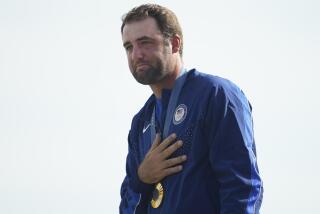Now, West Germany Can Finally Forget Ol’ Hermann Tissies
- Share via
AUGUSTA, Ga. — OK, all you golf fans and media folks. For years you’ve been clamoring for a new superstar, someone who will stand out from the crowd (yawwwwn) of preppy, pastel and polyester young pros.
Your kid arrived Sunday.
His name is Bernhard Langer. He showed up on the doorstep at Augusta National Thursday morning, and by sundown Sunday he was wearing a green sport coat.
You’ll like him.
“I’m usually very well liked,” Bernhard said, in all modesty.
This kid (he’s 27) has some of the young Arnie Palmer’s charm and presence on the course, some of Arnie’s unwimpy athleticism, and maybe even some of Arnie’s golfing ability.
And, like Arnie did when he first captivated the galleries here 25 years ago, Langer stands out.
Take Bernhard’s background, for instance. He is the son of a bricklayer, born and reared in the farming hamlet of Anhausen, 40 miles from Munich.
Not since since Fernando Valenzuela pitched his way out of Etchohuaquila, Mexico, has a sports star emerged from from such an improbable place.
Not just Bernhard’s home town, but his home country. West Germany’s complete golf heritage and lore could be recorded on a postage stamp. Preferably on the back side.
Until Sunday, the most famous West German golfer was Hermann Tissies, who slashed his way into golf history one day in 1950 by carding a grotesque 15 on a par-3 hole in the British Open. One Scottish writer described the moment as “a horrible species of Ping-Pong played between bunkers.”
So Bernhard Langer had few early golf role models.
Someone asked him Sunday, who was the greatest West German golfer, before Bernhard Langer?
“In my eyes,” he said, “it was Tony Kugelmuller.”
Ah, yes, Tony Kugelmuller, with two dots over the “u.”
Langer didn’t need heroes as incentive to take up golf. He got into the sport at the age of 8 because his father couldn’t afford to give him an allowance.
Bernhard became a caddy, like his older brother, at the Augsburg Golf Club, five miles from home by bicycle. Bernhard earned 2 marks 50 (85 cents) per nine holes, and lived in a tent, getting up at dawn to play the course before the members showed up.
Some days, Bernhard would play as many as 80 holes.
That sounds like a lot, but sometimes all 80 holes were in one green.
See, they have bad greens in that country. The greens there aren’t mowed, they’re grazed.
To an America golf pro, bumpy and shaggy might be the names of your college fraternity brothers. In West Germany, they are the adjectives most often used to describe the greens.
An unlikely setting for the birth of a golf superstar, but who knows where the spark of genius will be struck?
Bernhard turned pro at 14.
To make a long story short, he took over Europe. He became the first German to win the German Open, which tells you something about the state of golf there. He won the Italian Open, Irish Open, Dutch Open, French Open, Spanish Open.
He came to America, married a Southern girl, joined the PGA tour full time this year and Sunday he won his first American tournament.
While Curtis Strange was wading in creeks, to the theme music from “Jaws,” Bernhard Langer keep his cool, barged into the lead and into our hearts, fans.
He doesn’t wear funny hats or pants, but you’ll be able to pick him out when he comes to a major tournament near you.
Bernhard is slight (5-9, 155) but not frail, with a shock of curly, blond hair, bright blue eyes and a smile that could sell toothpaste.
He is a former alter boy, a non-drinker and he has a nice sense of humor.
His iron shots are as straight as a Georgia pine and his putting isn’t bad, considering that he sometimes grips the putter cross-handed and considering where he learned that art.
He’s famous all over Europe, and now he’ll be famous in America. Someday he might even be famous in West Germany.
Last year German sportswriters selected that country’s Sportsperson of the Year, and Bernhard wasn’t even nominated.
His primary endorsement is Jaguar automobiles, made in England.
“Who knows,” he said not long ago, “when I’m famous in Germany, I may drive a Mercedes.”
Langer said Sunday he hopes his Masters victory will inspire German kids.
“I hope there’s going to be a reaction (in Germany),” he said. “I hope lots of youngsters will see the tournament on TV an pick up this game, and it will become more popular.”
Let’s hope so. Most German kids are still traumatized by the legacy of Hermann Tissies at Troon in 1950.
Meanwhile, back in America, you fans may have found yourselves a new hero.
More to Read
Go beyond the scoreboard
Get the latest on L.A.'s teams in the daily Sports Report newsletter.
You may occasionally receive promotional content from the Los Angeles Times.










